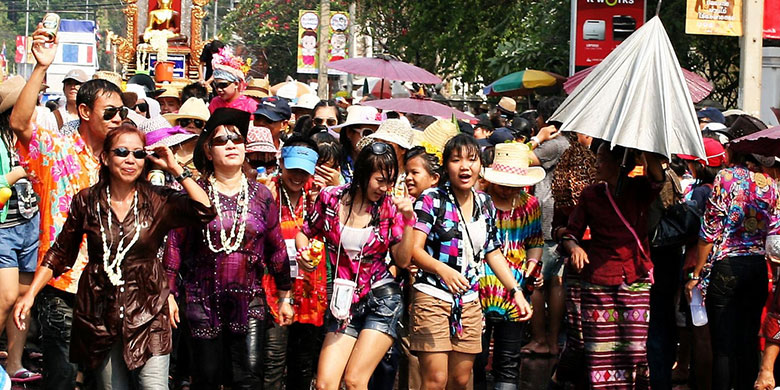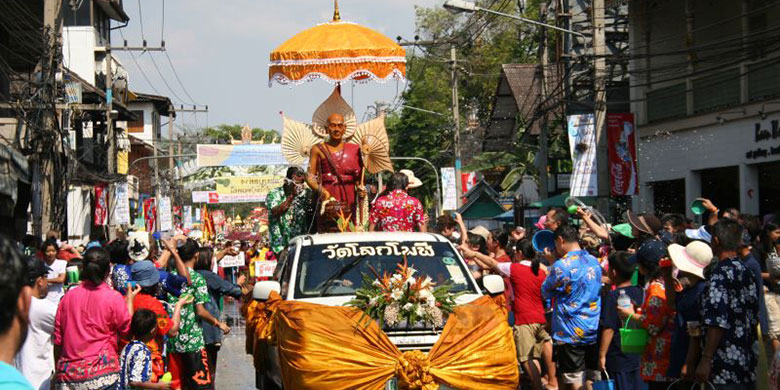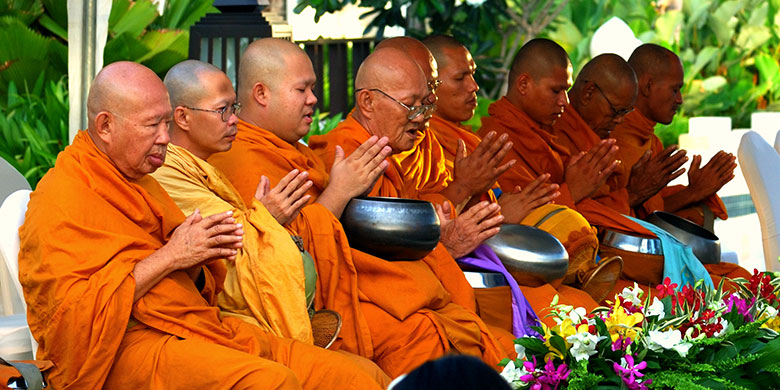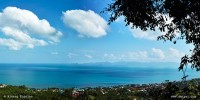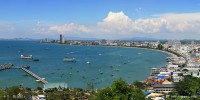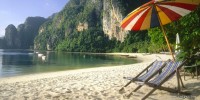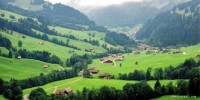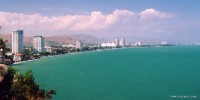Songkran 2013 (Thai New Year) (13-16 April, 2013)
Songkran (สงกรานต์) marks the new year on the Thai calendar, and is a festive holiday going back hundreds of years. Derived from Sanskrit, the name literally means “astrological passage” and is now celebrated from 13-16 April on the Western calendar every year (historically, however, the Thai New Year was in fact calculated based on the solar calendar, and varied from year to year). In nearby countries, Songkran is also celebrated, but with a different name: Pbeemai (ປີໃໝ່) in Laos and Chaul Chnam Thmey (បុណ្យចូលឆ្នាំថ្មី) in Cambodia, etc.
In recent years, Songkran has become world famous because of the nation-wide “water fight” that takes place in Thailand, attracting thousands of tourists who readily take part in throwing water and talcum powder (or chalk) at each other and at Thai citizens alike. Among Thai citizens, though, it is largely a time for family reunions, temple trips, visiting friends, and cleaning house. Although the holiday is just a few days long, most students and employees get a week off from work, and most banks, offices, and shops close down during Songkran.
Warning to shy or easily-panicked travelers!
Songkran is celebrated absolutely everywhere in Thailand, and the party nearly always starts a week early (and sometimes earlier). Therefore, if you have no desire to be soaking wet 24/7, and stuck for long periods of time in between drinking, screaming, dancing, singing, good-timing people under the hot and humid spring weather of April’s stormy season, then re-consider visiting Thailand during this holiday!
Buddhist tradition that evolved into a party…
Traditionally, the first day of Songkran is considered National Elderly Day on which Thais will perform the Rod Nam Dum Hua ritual, pouring fragrant water into the palms of elders as a sign of humility and to ask for their blessing. The second day of Songkran is National Family Day, and many Thai families will wake up early to give alms to local Buddhist monks, and later will enjoy spending time with relatives.
Those who celebrate the Buddhist aspect of Songkran will pray and bring food to monks at Buddhist temples (wats) in Thailand. Typically, Thai Buddhists will also wash/clean images and statues of Buddha at their house with water, as a show of respect for the new year. Some families will collect the runoff of this “cleansing” water and gently pour it over the shoulders of relatives and friends as a sort of blessing.
After many years of this, however, younger generations began to enjoy the refreshing aspect of pouring water on each other during the warm April season, which is how the present-day “water fight” eventually came about and grew into a fun-filled party.
Common Thai language greetings for Songkran
“สวัสดีปีใหม่” (sawadee pai mai) is an extremely common greeting throughout the Songkran holiday, which basically means “Happy New Year” based on the word “สวัสดี” (sawadee) which is the famous Thai expression for communicating a friendly hello or goodbye. Alternatively, “สุขสันต์วันปีใหม่” (suk san wan pai mai) is a more precise translation from English, as “suk san” is a more literal reference to “happy.” However, because of the increasing internationalization of Western New Year (January 1st), the saying “สุขสันต์วันสงกรานต์” (suk san wan songkran) has also become quite popular compared to some other phrases in recent years, literally meaning “Happy Songkran Day.”
Where is the best place to celebrate Songkran?
While Songkran is celebrated in all areas of Thailand with great passion, it is perhaps most recognized in the northern areas, especially in the city of Chiang Mai. The north of Thailand is known to be quite in touch with traditional Thai culture and traditions, with strong Buddhist roots and a slow, friendly pace of life. Below you may find other regional festivities that have grown to become very well-known in Thailand.
Official Songkran festival locations:
- Chiang Mai Songkran Festival, Chiang Mai
- Sukhothai Songkran Festival
- Bangkok Songkran Splendours Festival
- Phra Nakhon Si Ayutthaya Songkran Festival
- The Great Songkran Day Suphan Buri Province
- Phra Padaeng Songkran Festival, Samut Prakan
- Nakhon Si Thammarat Songkran Festival
- Songkran on the Beach & Phuket Bike Week
- Hat Yai Midnight Songkran Festival, Songkhla
- Chon Buri Songkran Festival
- Songkran Festival and Dok Khun Siang Khaen Festival on Khao Nieo Road
- Nakhon Phanom Songkran Festival
- Nong Khai Songkran Festival
Popular tourist (water fight) areas:
- Kao San Road or Silom area in Bangkok
- Beach Road or 2nd Road in Pattaya
- Patong area of Phuket island
Popular traditional (Buddhist) activities:
- Sanam Luang opposite the Grand Palace – the famous Buddha image “Buddhasihing” is brought out from the National Museum and escorted along the local streets
- Phetchabun – hosts a famous Queen Songkran contest, and there is also a water festival that happens at Khao Phod Road, also known as Burakomkowit Road
- Amphoe Chiang Saen – Nang Songkran procession and competition which features the bathing of the Buddha, along with a 22-men rowboat competition
- Wisutkasat – a Miss Songkran Beauty contest is held in this area, accompanied by merit-making, a local parade and other related activities
- Rattanokosin – building of sand stupas which are then decorated with colorful flags and flowers that can be seen around key local temples
- Phra Pradaeng – Thai-Raman communities show off ancient Songkran traditions about a week later than normal (flags, games, dances, boat races, parades)
- Chiang Mai – one of the biggest Songkran celebrations including a procession around the city and pouring blessed water on the face of Buddha
Safety warnings and cultural respect during Songkran
While Thais are known, for good reason, to be fun-loving people with hospitable charm, the country is still deeply Buddhist and takes great pride in its history and culture. If you are visiting Thailand for the first time, keep these words of caution in mind:
Good Ideas (DO’s)
- DO accept blessings from Buddhist monks and from other people when offered to you
- DO give alms and make merit by following the example of Thais (if you so wish)
- DO waterproof any valuable electronics or other items (or leave at home)
- DO watch your belongings as crowded places always attract thieves
- DO use public transportation whenever possible to avoid traffic
- DO use extreme caution when riding cars or motorbikes
- DO smile and wish others “สวัสดีปีใหม่” (sawadee pai mai)
Bad Ideas (DONT’s)
- Do NOT throw water on monks, babies, or the elderly
- Do NOT throw water that is dirty or contains ice cubes
- Do NOT throw water at cars or motorbikes which is very dangerous
- Do NOT drive after drinking alcohol, or with others who have been drinking
- Do NOT expect to arrive to destinations on time, including offices, hotels, or airports







